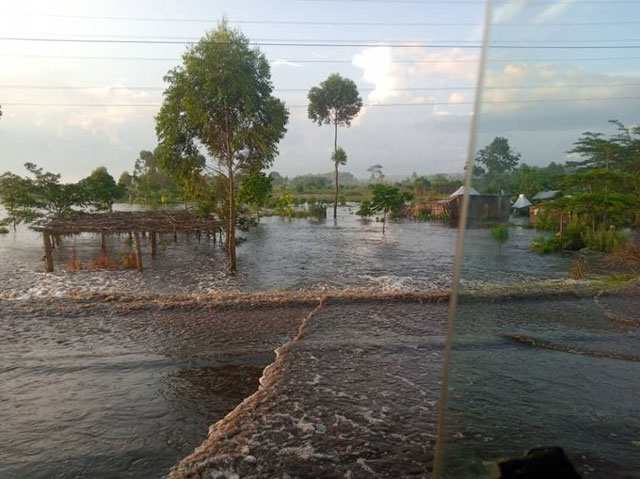
Kampala, Uganda | THE INDEPENDENT | Public transporters plying the Kampala-Masaka Highway have tripled fares following the flooding of River Katonga in Mpigi District.
On Thursday, the Uganda National Roads Authority -UNRA and the Traffic Police closed the road to stop motorists attempting to maneuver through the risen water levels of River Katonga, which crosses through the highway.
A section of the road, including the bridge was submerged with water due to increased water volumes and pressure from the various tributaries that flow into the river’s main course as it advances to Lake Victoria.
UNRA advised motorists to use the alternative route of Mpigi-Kanoni through Sembabule-Villa Maria to Masaka.
The diversion is taking a heavy toll on passengers after drivers hiked transport fares through the alternative route, which is about 190 kilometers between Masaka to Mpigi districts.
From the usual fare of 12,000Sshillings from Masaka to Kampala, the passengers are now being charged between 45,000 to 50,000 Shillings.
Francis Ssekelemba, one of the affected passengers says he was forced to call back home for additional money, to enable him to complete the journey through the alternative route.
He argues that being a regular traveler between Kampala and Masaka, the fare is too high for him, fearing that it is going to negatively impact his income, Ssekelemba has called upon UNRA to urgently work out a plan such that traffic flow is restored on the highway.
Bashir Mawanda, a driver on Kampala-Masaka road indicates that the rising of the fares was inevitable for them because the route has generally increased the fuel consumption of their vehicles.
“Our only prayer is that the road is fixed quickly such that we can return to the normal route,” says Mawanda.
Allan Ssempebwa, the Head of Communication at UNRA indicates in a public statement issued on Thursday that the diversion will remain in place until water levels have sufficiently subsided.
But Francis Bbuye, the Chairperson of Kayabwe Sub County in Mpigi District, says that water has also invaded people’s residents and businesses in the area.
According to Bbuye, residents in the neighboring villages of Muge, Nabyewanga, Kankobe, and Katonga have badly been affected by the flooding of the river, indicating their floods have invaded their homes and plantation and caused them heavy losses.
Bbuye explains that the flooding is a result of the accumulation of high volumes of water in the swamp located adjacent to River Katonga and the several tributaries that directly drain into the river’s main course.
He also partly attributes the flooding to human activities in the swamps along River Katonga, which led to interference and diversion of water flow hence forcing its way back to the main river course whenever it rains.
*****
URN
 The Independent Uganda: You get the Truth we Pay the Price
The Independent Uganda: You get the Truth we Pay the Price


